Suchergebnisse für "Factsheet: Energietechnologien gestalten, die für alle sinnvoll und nutzbar sind"
Smart Pölten 2.0 - Ganzheitliche Betrachtung einer Vertical Farm in Vorbereitung eines Demonstrationsprojektes in St. Pölten
Die Stadt St. Pölten sieht in Vertical Farming großes Potential hinsichtlich der Ziele des Smart City-Konzeptes durch die Verknüpfung von lokaler Lebensmittelproduktion, Lebensqualität und Reduktion des Ressourcenverbrauchs. Um dieser Zielsetzung gerecht zu werden sollen Vertikale Farmen an Bestandsgebäuden entwickelt werden. Öko-soziale und sozio-ökonomische Betrachtungen spielen hierbei mit eine tragende Rolle.
EPIKUR – Energieeffizienz-Potential intelligenter Kernverdichtung des urbanen Raums
Das gegenständliche Forschungsvorhaben befasste sich mit den Möglichkeiten, Implikationen und Rückkopplungen, die sich durch eine "Stadterweiterung nach innen" mittels innerstädtischer urbaner Verdichtung ergeben. Dabei wurde Nachverdichtung als paradigmenfrei untersucht, d.h. unabhängig von bestehenden Regulativen, sondern anhand des vernünftig machbaren.
G2G – Innovationsachse Graz-Gleisdorf
Entwicklung von Test- und Demonstrationsgebieten im Rahmen von ausgewählten Stadt(teil)entwicklungsvorhaben entlang der Innovationsachse Graz-Gleisdorf mit Fokus auf die Bereiche Energie, integrierte Gebäudetechnologien, smarter Stadtraum, kompakte Siedlungsstruktur, Nutzungsmix - Stadt der kurzen Wege, Generationenwohnen, intermodale Mobilität sowie Informations- und Kommunikationstechnologien (IKT).
CO2 neutrale Stadtteilentwicklung Itzling
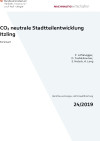
Ziel des Projekts „Itz Smart“ ist die Anknüpfung an bestehende Aktivitäten und die konsequente Weiterentwicklung des Wohnstandorts Itzling. Im Test- und Demonstrationsgebiet werden im Bereich der Verkehrsachse (Bahn und Schillerstraße) bzw. angrenzend an die Nahversorgungsachse (Itzlinger-Hauptstraße) nachhaltige Wohnquartiere mit zukunftsweisenden Mobilitätslösungen entwickelt. Die Betrachtung von „Wohnen und Mobilität“ zieht unter dem Aspekt „Stadt der kurzen Wege“ auch die Auseinandersetzung mit gezielter Mischnutzung und der Entwicklung solcher Quartiere nach sich.
Schriftenreihe
24/2019
P. Lüftenegger, D. Teufelsbrucker, S. Netsch, A. Lang
Herausgeber: BMVIT
Deutsch, 108 Seiten
Downloads zur Publikation
Städtebauliche Exkursion "Kopenhagen - Malmö - Stockholm"
Im Zuge einer städtebaulichen Exkursion, organisiert von der TU Graz im Auftrag des bmvit, besuchte eine 25-köpfige Gruppe die skandinavischen Wachstumszentren Kopenhagen, Malmö und Stockholm.
VERTICAL urban FACTORY
Das Projekt beforscht Möglichkeiten und Potenziale hocheffizienter Raumnutzung durch moderne Konzepte „gestapelter“ Funktionen und vertikaler Produktion.
PV-Gemeinschaftsanlagen: Sondierung eines partizipativen Pilotprojekts mit Mehrwert in strukturschwachen Städten (MehrWertStrom 2030)
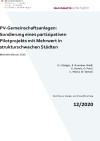
Das Projekt MehrWertStrom 2030 untersuchte die rechtliche, technische, organisatorische und wirtschaftliche Machbarkeit von PV-Gemeinschaftsanlagen auf Mehrparteienhäusern unter Bezugnahme der regionalen Wertschöpfung in strukturschwachen Regionen und erarbeitete neue Lösungsmodelle in Bezug auf Organisation, Finanzierung und Realisierung.
Schriftenreihe
12/2020
O. Schlager, R. Brandner-Weiß, G. Heneis, O. Percl, C. Plöchl, W. Wetzer
Deutsch, 69 Seiten
Downloads zur Publikation
Plug&Play Storage of Photovoltaic Power (P3Power)
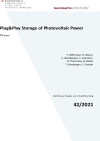
Im Projekt P³Power wird die Messtechnologie NetDetection (Abschätzung des Leistungsverbrauchs an einer Phase von einem beliebigen Messpunkt, z.B. einer Steckdose, in einem Haushalt) entwickelt. Auf Basis dieser Technologie werden plug&play Photovoltaik- und Speichersysteme realisiert, welche 100% Eigennutzung innerhalb beliebiger Aggregationsgrößen - vom Mehrfamilienhaus bis zur Gemeinde - ermöglichen ohne bestehende Installationen adaptieren zu müssen. Die Technologie wird digitalisiert, im Laborumfeld und in Realhaushalten getestet und zu einem umfassenden Energie-Service-Angebot weiterentwickelt.
Schriftenreihe
42/2021
Y. Wittmann, H. Bieser, S. Weinberger, C. Grimmer, B. Thormann, B. Böckl, T. Kienberger, V. Hacker
Herausgeber: BMK
Deutsch, 48 Seiten
Downloads zur Publikation
INN'FIT4UM - Innsbruck "Fit4UrbanMission" - klimaneutrales Innsbruck 2030
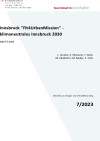
Ziel in INN’F4UM ist es, aufbauend auf einer aktuellen Darstellung der Energie- und Ressourcenflüsse gemeinsam mit der Universität Innsbruck einen Stufenplan zur Erreichung der Klimaneutralität der Stadt bis 2030 zu entwickeln.
Schriftenreihe
7/2023
L. Jänicke, K. Kleewein, Y. Back, M. Kleidorfer, M. Mailer, F. Ochs
Herausgeber: BMK
Deutsch, 39 Seiten
Downloads zur Publikation
Innovationsachse Graz-Gleisdorf (G2G)
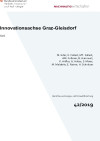
Entwicklung von Test- und Demonstrationsgebieten im Rahmen von ausgewählten Stadt(teil)entwicklungsvorhaben entlang der Innovationsachse Graz-Gleisdorf mit Fokus auf die Bereiche Energie, integrierte Gebäudetechnologien, smarter Stadtraum, kompakte Siedlungsstruktur, Nutzungsmix - Stadt der kurzen Wege, Generationenwohnen, intermodale Mobilität sowie Informations- und Kommunikationstechnologien (IKT).
Schriftenreihe
42/2019
M. Eder, K. Fallast, MT. Fallast, AM. Fulterer, B. Hammerl, K. Höfler, G. Huber, S. Maier, M. Malderle, E. Rainer, H. Schnitzer
Herausgeber: BMVIT
Deutsch, 115 Seiten
Downloads zur Publikation
VisErgyControl - Integral control system for daylight and artificial lighting for high visual and melanopic comfort with minimized primary energy consumption
Within the project VisErgyControl an integral, simulation-based, energy-efficient open loop daylight and artificial lighting control system had been developed. The research project focuses on the visual and melanopic requirements of users while minimizing the energy consumption for heating and cooling.
Green and Resilient City - Management and planning tools for a climate-sensitive urban development
The aim of the project was to provide a "proof of concept" of a control loop and tool set for the management, optimization and evaluation of green and climate-sensitive urban (district) planning- The tool set consist of urban and open space planning instruments as well as climate simulations at different scale levels.
Enerspired Cities - open and harmonized infomation basis for energy oriented urban planning
In "Enerspired Cities" the concept for an automized junction of judicial secured access regulation to (geo-)energy data is elaborated. This will be adapted to the specific situations in the cities of Innsbruck, Salzburg and Vienna and implemented in dedicated pilot applications. The declared aim is the support of urban planning, monitoring and research by an easy and transparent access to base data coming from various sources for a wide range of users.
Urban district heating extended – Development of flexible and decarbonized urban district heating systems
Development of innovative urban district heating systems by integration of long-term thermal storage, large scale heat pumps, large scale solar thermal installations, waste heat recovery and analysis and evaluation by simulation. The results of this project will provide templates for technology selection, system design and merit order for new urban district heating areas.
digiactiv - digital transformation for more interactivity in MEP-(mechanical, electrical and plumbing-)planning
The aim of the digiactiv project is to improve the interoperability between the different stakeholders in the building construction sector using open and neutral semantic data models. With digital transformation processes, digiactiv helps to increase the quality of planning and the operation of buildings, as well as to minimize the interface risk between various stakeholders.
KityVR - Artificial intelligence techniques to implement CityGML models and VR visualization
The goal of the project is to link 3D city models and virtual reality for energy-relevant applications as key-enabler for digital planning, construction and operational management. Missing data will be calculated using statistical enrichment methods.
SC_micro-quarters – Planning and modernisation of smart city quarters with a view to energy optimisation and a high quality of life
The SC_micro-quarters project demonstrates possibilities for urban planning and urban quarter development with a view to creating a path to a low carbon city with a high quality of life and good resilience, while taking into account existing and proposed buildings, infrastructures and uses. The central element is the modelling of urban structures at micro-quarter level.
VITALITY District - Optimized energy concepts in the early planning phase of resilient, energy-efficient neighbourhoods
The aim of the VITALITY District project is to coordinate the total (electrical and thermal) load and generation profile in the design phase of urban areas and neighbourhoods in order to optimize the energy concept of energy-efficient districts. Hence smart city indicators in detailed level (buildings, individual technologies, public spaces) as well as models, principles and catalogs of criteria for energy-optimized urban neighbourhoods are going to be created. The results are going to be presented in compact form on the district level in order to serve as input for future urban planning projects.
Stanz+ - An innovative, energy-flexible plus-energy district - the centre of the village Stanz
Stanz+ is working on the implementation of an energy strategy for structurally weak municipalities with specific measures for revitalisation and re-densification in the building stock as well as the integration of renewable energy sources in the municipality of Stanz im Mürztal (Styria). The project includes multipliable approaches towards energy autonomy, hybrid use of energy networks for flexible usage and an energetic revitalisation of the village centre with the involvement of users in the "Rural Pioneers Community" for the usage of energy services.
Itz Smart – Carbon neutral city district development Itzling – Implementing innovation and technology via co-operative process design
The goal of the project “Itz Smart” is to tie in with existing activities and to consistently develop Itzling as a residential location further. In the test and demonstration area, sustainable residential quarters with trendsetting solutions for mobility are developed in the zone of the transport axis (railway and Schillerstraße) and along the local supply axis (Itzlinger Hauptstraße). The consideration of housing and mobility with regard to the aspect of “city of short ways“ also entails a discussion of determined mixed utilisation and the development of such residential quarters.
